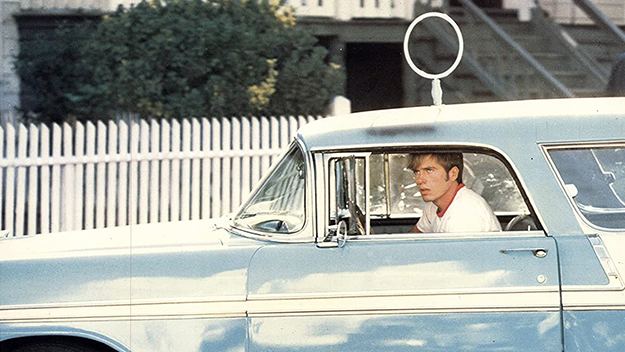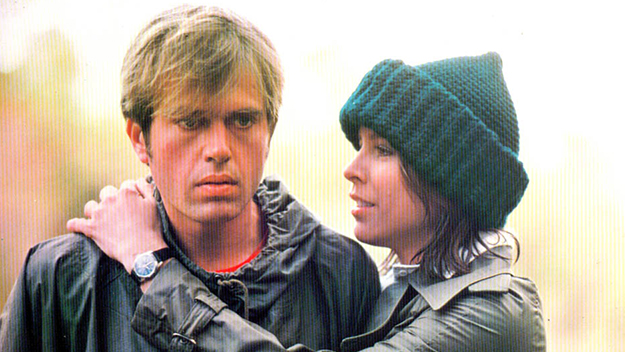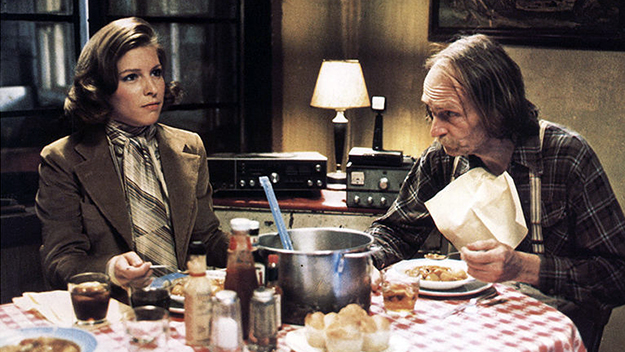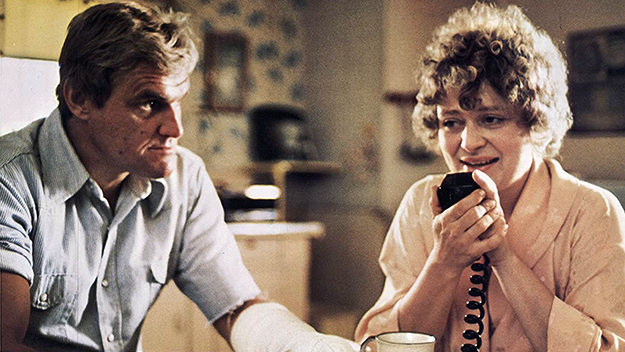Present Tense: Citizens Band
Present Tense is a column by Sheila O’Malley that reflects on the intersections of film, literature, art, and culture.

Images from Citizens Band (Jonathan Demme, 1977)
“Wall-to-wall” – CB slang for “Signal is crystal clear”
The night is full of voices, voices bursting through thick static and then receding, voices overlapping in a fragmented symphony. Voices fling themselves into the void: “Hello? Hello?” The opening sequence of Jonathan Demme’s 1977 film Citizens Band is dreamlike, the voices murmuring and barking and whispering, restlessly, over close-up drifting shots of wires, circuits, dials, blinking On the Air signs … Chilly technology and warm humanity, wedded. The voices are disembodied, but each one is attached to a person, holed up alone, huddled over a CB radio, looking for others out there in the darkness. There are complaints about the over-crowded eavesdropping airwaves: “Trying to talk and hear at the same time’s like tryin’ to eat and kiss.” A voice asks a question with an almost lonely existential aura: “How do you know if anyone’s listening?”
It’s not the listening that’s the problem, really. Listening is easy. It’s hearing that’s hard.
Citizens Band takes place in a Nebraska town called, symbolically, Union. Union once perched right off the exit of a busy freeway, making the town a pit-stop for truckers and travelers, looking for gas, a drink, or some shut-eye in the local “nap trap” (CB slang for “motel”). But once the freeway moved, the town fell into almost forgotten status. Surrounded by wide plains pierced by lonely two-lane blacktop, Union is a grease-under-fingernails working-class town with a citizenry made up of kooks and dreamers. Everyone dreams of something better, whether that something better is in the past or the future. Screenwriter Paul Brickman (who eventually went on to write and direct Risky Business) put together his multi-character screenplay in mostly short scenes, with different story-lines unfolding simultaneously, almost in real time. The overall effect is of a seething mass of humanity, only the action really takes place out there, in the airwaves.

The characters’ CB handles are more important than their real names. Blaine (Paul Le Mat, charismatic and vulnerable), aka “Spider”, lives with his crotchety maybe-senile father (Roberts Blossom), a former trucker who owns a junk yard and only comes to life when he’s on the CB radio, talking to old trucker friends as “Papa Thermodyne”. Blaine is busy with REACT (the Radio Emergency Associated Citizens Teams), monitoring the CB radio for any motorist who might be in trouble on the road, all while trying to keep his neighbors from cluttering up the channel. Pam (Candy Clark), whose CB handle is a spoiler, was Blaine’s one-time fiancee, and he’s still hung up on her. Dean (Bruce McGill) is Blaine’s bitter brother (aka “Blood”), a gym coach at the local high school, surrounded by trophies from his former glory days. Charles Napier plays Harold (aka “Chrome Angel”), a trucker who drives his 18-wheeler full of cattle off the road, and is forced to stop over in Union. Debbie, the friendly “working girl” in town, who once serviced all of the truckers before that damn freeway moved, goes by the handle “Hot Coffee” and she and Chrome Angel go way back. The “band” is clogged with other voices, eventually recognizable: “The Red Baron” (Harry Northup), a Nazi spouting statements like “Hitler was a good ol’ boy!”, an ancient old biddy (aka “Grandma Breaker”) droning stories of her girlhood, a preacher (Ed Begley, Jr.) shouting about hellfire, and a mysterious breathy sexpot calling herself “Electra” who croons in the ear of “Warlock” (Will Seltzer), a teenage kid in sexual agony in his car: “There are a lot of voices out there. Yours is different. I like it.”
Over the course of Citizens Band, Blaine, fed up with with the frustrations of his life, goes on a vigilante mission, cutting the antenna wires of those who refuse to abide by FCC rules. Chrome Angel has his own drama: stuck in town, he makes two phone calls, one to his wife in Dallas, and one to … his other wife in Portland. The two women (Ann Wedgeworth, Marcia Rodd, both terrific), each convinced he’s cheating on her, head to Union to join up with him; during the journey they meet one another and discover their mutual husband’s duplicity.

The way this love-triangle sorts itself out, all with the support of “Hot Coffee” is not what you would expect, and is eloquent of Citizens Band’s attitude towards humanity. It’s eloquent too of what we might call director Jonathan Demme’s worldview. After directing three films under the umbrella of Roger Corman (Caged Heat, Crazy Mama, Fighting Mad) he helmed Citizens Band, and despite it being early on in Demme’s career, it is recognizably his, in its eclectic ensemble and in its empathy towards people in all their mess and selfishness and flaws and kindness. That empathy, spiked with humor, was one of Demme’s distinguishing qualities, whether it was in Something Wild, Swing Shift, Rachel Getting Married or his effervescent concert films like Stop Making Sense and Justin Timberlake + the Tennessee Kids. Demme encouraged audiences to withhold judgment, to receive rather than to project. Citizens Band is cheerfully unjudgmental about practically everything: sex workers and their clients, infidelity and bigamy, vigilante violence … even the Nazi has a moment of redemption.
At one point, Blaine cries out in frustration, “Everybody in this town is somebody they’re not supposed to be!” The CB handles are Avatars: you can be anything out there on the air. There is some equivalence to today’s internet technology, to the “bots” spreading disinformation on Twitter or the treachery of anonymous comments sections, but Charles Taylor, in his chapter on Citizens Band in Opening Wednesday at a Theater or Drive-In Near You, observes “CBs add what texting and e-mail and instant messaging delete: an immediate human presence. Hearing the voice of another person prevents the inevitable misreadings of tone that characterize online communication, allowing you to hear, right away, the effect of your words on the person you are talking to.” In the world of Citizens Band, people put out their Ids on the air, their ultimate wants, desires, needs. This is true for the Nazi, it’s true for the 10-year-old kid calling himself “Hustler.” It’s true for the nerdy virgin “Warlock”, having CB-radio-sex with Electra on a nightly basis.

Some fantasies are destructive, of course. But when you think of someone who lives in a fantasy world, like Blanche Dubois in Streetcar Named Desire: does Blanche’s fantasy of herself as a Southern belle really hurt anyone? Isn’t it a way to create a moat around her sensitivity, to shield herself from’ cruelty, but also, crucially, to find love and protection? Maybe we should be kinder towards other people’s fantasies. Maybe we should cut people some slack. The blinding light of reality 24/7 is no great shakes. The people of Union have a lot of reality to deal with: economic hard times, frustration, broken hearts, the universal stuff of life. Their CB call handles are protective coloring, but, as Kabuki masters know: the mask may conceal but it also reveals. When Blaine’s father is just Blaine’s father, he lies collapsed in a drunken heap. When Blaine’s father is “Papa Thermodyne”, he’s engaged with others, he’s enthusiastic: in remembering who he used to be, he remembers who he is. Citizens Band is full of such gentle little revelations. It’s a subversively profound movie.
Citizens Band came out the same year as Smokey and the Bandit, the most well-known “CB-inspired” movie, with Jerry Reed’s “Eastbound and Down” the trucker anthem to end all anthems. Sam Peckinpah’s Convoy came out the following year, inspired by C. W. McCall’s song of the same name, with lyrics made up almost entirely of CB slang. CB radio has been around since the 1940s, but it wasn’t until 1975 that the FCC allowed its use for hobbyists and civilians. It quickly became a craze. Citizens Band, then, spoke to the present moment in all kinds of unexpected ways for what could have been just a lighthearted comedy: the recession of the 1970s, the oil crisis leading to the imposition of the 55mph speed limit (which had a devastating impact on truckers’ schedules, an additional hardship for poor Hot Coffee), the ubiquitousness of CBs, and the sense that America had lost its way, that possibility no longer existed. Papa Thermodyne says in a moment of bitter clarity, “This country promises everything you never see. You ever see any of it?” Chrome Angel, though, such a goofball optimist he has married two women and thinks somehow it can be worked out between the three of them, says to Hot Coffee, “It’s a funny country. I mean, everything’s goin’ mobile. If you can accept that, I mean if you can swing with it, you can do anything.”
Everything’s goin’ mobile. He was more right than he knew. Wall to wall, Chrome Angel, wall to wall.
Sheila O’Malley is a regular film critic for Rogerebert.com and other outlets including The Criterion Collection. Her blog is The Sheila Variations.







